A doctor is to visit a patient. From past experience, it is known that the probabilities that he will come by train, bus, scooter or by car are repectively 310,15,110and25. The probabilities that he will be late are 14,13and112, if he comes by train, bus and scooter respectively, but if he comes by car, he will not be late. When he arrives, he is late. What is the probability that he has come by train ?
To solve the problem, we will use Bayes' theorem, which helps us find the probability of an event given the occurrence of another event. We want to find the probability that the doctor came by train given that he is late.
Step 1: Define the Events
Let:
- E1: The event that the doctor comes by train.
- E2: The event that the doctor comes by bus.
- E3: The event that the doctor comes by scooter.
- E4: The event that the doctor comes by car.
- L: The event that the doctor is late.
Step 2: Given Probabilities
From the problem, we have:
- P(E1)=310
- P(E2)=15=210
- P(E3)=110
- P(E4)=25=410
The total probability must sum to 1:
P(E1)+P(E2)+P(E3)+P(E4)=310+210+110+410=1
The probabilities of being late given the mode of transportation are:
- P(L|E1)=14
- P(L|E2)=13
- P(L|E3)=112
- P(L|E4)=0 (the doctor is never late if he comes by car)
Step 3: Apply Bayes' Theorem
We want to find P(E1|L):
P(E1|L)=P(L|E1)⋅P(E1)P(L)
Step 4: Calculate P(L)
Using the law of total probability:
P(L)=P(L|E1)⋅P(E1)+P(L|E2)⋅P(E2)+P(L|E3)⋅P(E3)+P(L|E4)⋅P(E4)
Substituting the values:
P(L)=(14⋅310)+(13⋅210)+(112⋅110)+(0⋅410)
Calculating each term:
1. P(L|E1)⋅P(E1)=14⋅310=340
2. P(L|E2)⋅P(E2)=13⋅210=230=115=8120
3. P(L|E3)⋅P(E3)=112⋅110=1120
Now, we find a common denominator (120):
P(L)=340+8120+1120=9120+1120=10120=112
Step 5: Substitute Back into Bayes' Theorem
Now substituting back into Bayes' theorem:
P(E1|L)=P(L|E1)⋅P(E1)P(L)=(14⋅310)112=340112=340⋅121=3640=910
Final Answer
Thus, the probability that the doctor has come by train given that he is late is:
910
Let:
- E1: The event that the doctor comes by train.
- E2: The event that the doctor comes by bus.
- E3: The event that the doctor comes by scooter.
- E4: The event that the doctor comes by car.
- L: The event that the doctor is late.
From the problem, we have:
- P(E1)=310
- P(E2)=15=210
- P(E3)=110
- P(E4)=25=410
P(E1)+P(E2)+P(E3)+P(E4)=310+210+110+410=1
- P(L|E1)=14
- P(L|E2)=13
- P(L|E3)=112
- P(L|E4)=0 (the doctor is never late if he comes by car)
We want to find P(E1|L):
P(E1|L)=P(L|E1)⋅P(E1)P(L)
Using the law of total probability:
P(L)=P(L|E1)⋅P(E1)+P(L|E2)⋅P(E2)+P(L|E3)⋅P(E3)+P(L|E4)⋅P(E4)
Substituting the values:
P(L)=(14⋅310)+(13⋅210)+(112⋅110)+(0⋅410)
Calculating each term:
1. P(L|E1)⋅P(E1)=14⋅310=340
2. P(L|E2)⋅P(E2)=13⋅210=230=115=8120
3. P(L|E3)⋅P(E3)=112⋅110=1120
P(L)=340+8120+1120=9120+1120=10120=112
Now substituting back into Bayes' theorem:
P(E1|L)=P(L|E1)⋅P(E1)P(L)=(14⋅310)112=340112=340⋅121=3640=910
Thus, the probability that the doctor has come by train given that he is late is:
910
Topper's Solved these Questions
- BAYES'S THEOREM AND ITS APPLICATIONSBOOK - RS AGGARWALCHAPTER - BAYES'S THEOREM AND ITS APPLICATIONSEXERCISE - Exercise 30
18 Videos
- AREA OF BOUNDED REGIONS BOOK - RS AGGARWALCHAPTER - AREA OF BOUNDED REGIONS EXERCISE - Exercise 17
39 Videos
- BINARY OPERATIONSBOOK - RS AGGARWALCHAPTER - BINARY OPERATIONSEXERCISE - Exercise 3B
8 Videos
Similar Questions
A doctor is to visit a patient. From the past experience, it is known that the probabilities that he will come by train, bus, scooter or by other means of transport are respectively 310,15,110and25.The probabilities that he will be late are 14,13and112 if he comes by train, bus and scooter respectively, but if he comes by other means of transport, then he will not be late. When he arrives, he is late.
What is the probability that he comes by train
View SolutionA doctor is to visit a patient. From the past experience, it is known that the probabilities that he will come by train, bus , scooter or by other means of transportation are respectiely 310,15,110 or 25. The probabilities that he will be late are 14,13 and 112 if he comes by train, bus and scooter respectively but if he comes by other means of transport, then he will not be late. If the arrives late, find the probability that he comes by train.
View Solution
Knowledge Check
A doctor is to visit a patient. From the past experience, it is known that the probabilities that the he will come by cab, metro, bike or by other means of transport are respectively 0.3, 0.2, 0.1 and 0.4. The probabilities that the he will be late are 0.25, 0.3, 0.35 and 0.1 if he vomes by cab, metro,bike and other means of transport respectively.
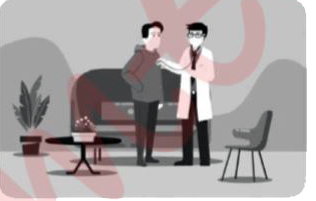
Based on the above information, answer the following questions.
When the doctor arrives late, what is the probability that he comes by cab ?A421B17C514D221A doctor is to visit a patient. From the past experience, it is known that the probabilities that the he will come by cab, metro, bike or by other means of transport are respectively 0.3, 0.2, 0.1 and 0.4. The probabilities that the he will be late are 0.25, 0.3, 0.35 and 0.1 if he vomes by cab, metro,bike and other means of transport respectively.
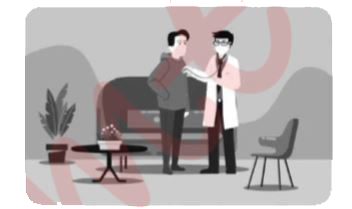
Based on the above information, answer the following questions.
When the doctor arrives late, what is the probability that he comes by other means of transport ?A67B514C421D27A doctor is to visit a patient. From the past experience, it is known that the probabilities that the he will come by cab, metro, bike or by other means of transport are respectively 0.3, 0.2, 0.1 and 0.4. The probabilities that the he will be late are 0.25, 0.3, 0.35 and 0.1 if he vomes by cab, metro,bike and other means of transport respectively.
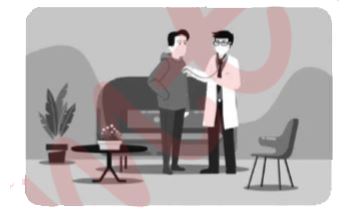
Based on the above information, answer the following questions.
When the doctor arrives late, what is the probability that he comes by bike ?A521B47C56D16
A person goes to his office by using different means of transport on different days. It is know that the probabilities that he will come by train, bus, scooter or by car are respectively 110,310,210 and 410. The probabilities that he will be late are 14,15,16, and 13 if he comes by train, bus, scooter and car respectively, on one day when he reaches office, he is late. What is the probability he has come by train?
View SolutionFind the error in the given sentence He will come when he will be ready.
View SolutionA doctor is to visit a patient. From the past experience, it is known that the probabilities that the he will come by cab, metro, bike or by other means of transport are respectively 0.3, 0.2, 0.1 and 0.4. The probabilities that the he will be late are 0.25, 0.3, 0.35 and 0.1 if he vomes by cab, metro,bike and other means of transport respectively.
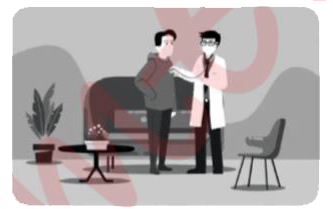
Based on the above information, answer the following questions.
When the doctor arrives late, what is the probability that he comes by metro ?
View SolutionA doctor is to visit a patient. From the past experience, it is known that the probabilities that the he will come by cab, metro, bike or by other means of transport are respectively 0.3, 0.2, 0.1 and 0.4. The probabilities that the he will be late are 0.25, 0.3, 0.35 and 0.1 if he vomes by cab, metro,bike and other means of transport respectively.
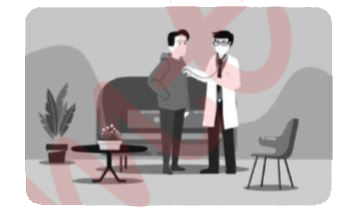
Based on the above information, answer the following questions.
What is the probability that the doctor is late by any means ?
View SolutionSelect the most appropriate option to improve the underlined segment in the given sentence. If there is no need to improve it, select ‘No improvement’.
Last week he promised that he would have come today, but he has not arrived yet.
View Solution
